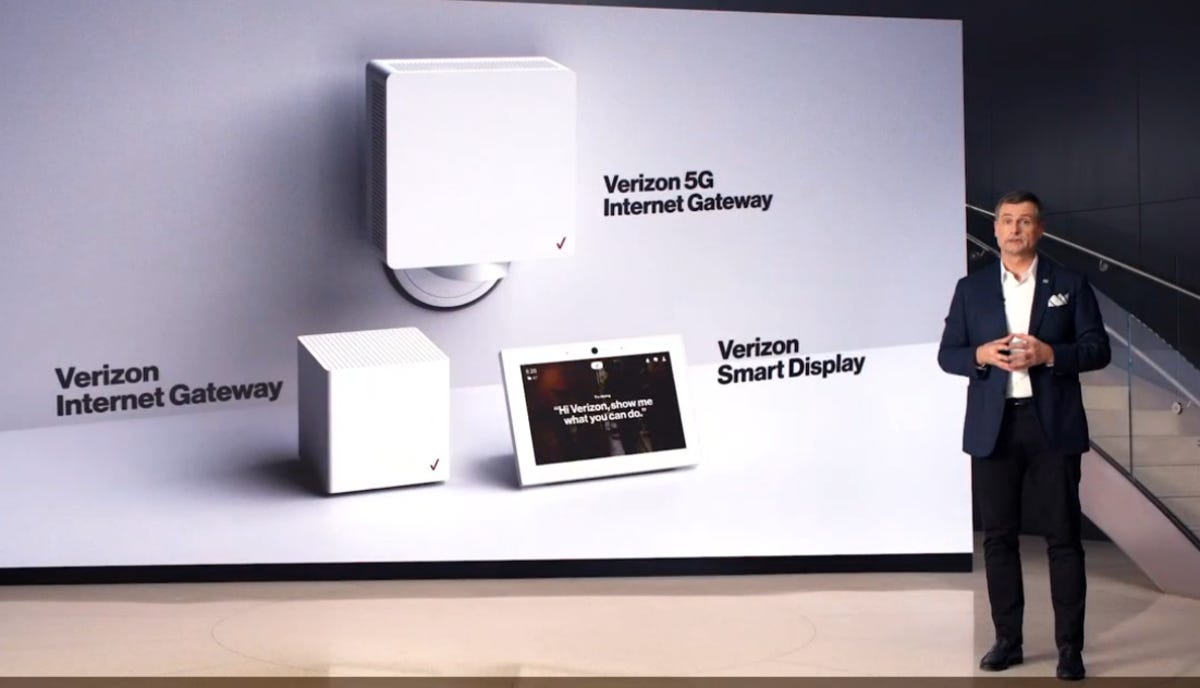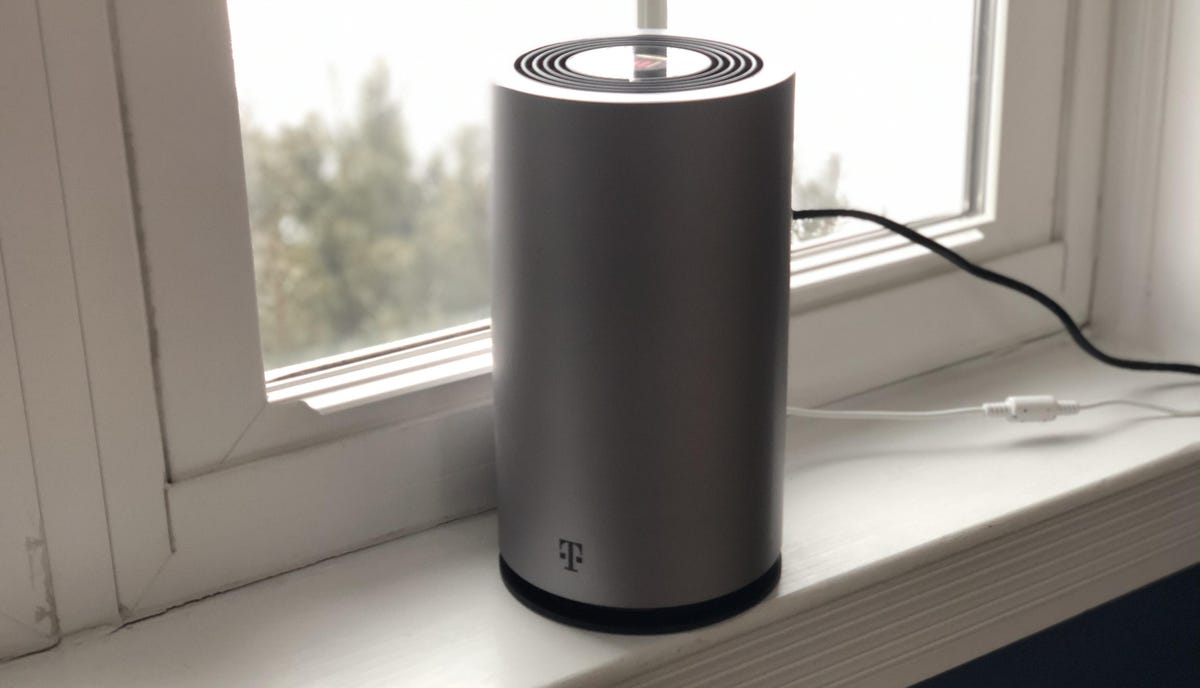 Why You Can Trust CNET
Why You Can Trust CNET
Our expert, award-winning staff selects the products we cover and rigorously researches and tests our top picks. If you buy through our links, we may get a commission. How we test ISPs
We need a reliable home internet connection to do almost everything, but the US still faces a stark digital divide. According to the latest data from the Pew Research Center, 73% of rural residents subscribe to high-speed internet at home, but they are still less likely to have access compared to 86% of suburban residents and 77% of urban residents. Additionally, the number of adults dependent on their smartphones for the internet has doubled in the past year. A growing number of cellular providers are responding to that need by introducing residential internet plans.
Cellular internet uses a router or hotspotto connect to a provider's cellular network, just like your mobile phone. The speed you receive mostly depends on how close you are to a network tower, but other factors like network congestion, how many connected devices you have and the location of your router can interrupt speeds. Most of the time, those cellular internet speeds are a lot slower than what you'd get consistently with fiber or cable, but if your location lacks those alternatives, then a cellular internet setup might be just what you need.
Since many big telecommunications companies offer these plans -- and 5G technology promises to make some of them even better -- let's see how they compare in price, speed and other aspects.
Verizon LTE Home Internet

Verizon continues to expand its cellular home internet services.
Screenshot by Eli Blumenthal/CNETVerizon LTE is meant for households that don't have access to the provider's other home internet services, like Verizon Fios. You'll connect to Verizon's 4G LTE network, with download speeds of 25 to 50 megabits per second and upload speeds of up to 5Mbps. That's roughly on par with DSL speeds and fast enough for basic web usage, HD streaming and light online gaming. Like the rest of Verizon's home internet offerings, Verizon LTE has no data caps.
Pricing for Verizon's LTE service depends on whether you already have cellular service with Verizon. If you have an eligible Verizon mobile plan (and enroll in autopay and paperless billing), then LTE residential internet service will cost you $25 monthly. That goes up to $50 per month if you don't have an existing Verizon mobile plan, which places Verizon LTE on par with what cable internet providers charge for service. In addition, the LTE plan comes with a Wi-Fi 6 router, and customers can enjoy the rate for two years. However, if cable providers are available in your area, they are likely to offer a faster connection at the same price compared to Verizon’s LTE network.
Verizon LTE is available to over 99% of the US population, but you'll need to check with Verizon to see if coverage is available at your address.
Verizon 5G Home Internet
Verizon 5G Home Internet is the company's more recent home internet offering and it promises a dramatic speed boost thanks to Verizon's 5G Ultra Wideband technology. After launching in 2022, Verizon expanded to over 900 markets. Since then, Verizon's 5G home internet has reached over 40 million households nationwide, not far from the projected goal of 50 million by 2025.
As for speeds, Verizon 5G Home downloads top out at 1Gbps, or 1,000Mbps, with average speeds at around 300Mbps. Uploads remain more modest, topping out at 75Mbps. 5G Home is $50 per month (with a two-year price guarantee), or $70 per month for 5G Home Plus, which carries a three-year price guarantee and additional plan perks. Customers can get $15-$25 off either tier if they subscribe to select 5G mobile plans. No annual contract is required, all equipment is included in the monthly price and there are no data caps. To entice potential customers, Verizon recently unveiled additional perks like streaming add-ons for just $10 extra a month.
T-Mobile Home Internet

T-Mobile's Home Internet gateway serves as modem and router, though you can also plug in an existing router or mesh network.
Rick Broida/CNETT-Mobile Home Internet touts simplicity as a benefit of its home broadband service. The 5G plans are priced from $50 to $70 a month with download speeds up to 245Mbps and upload speeds peaking at 31Mbps. The 4G LTE plans are also available and peak at 100Mbps. However, speeds will vary based on your location.
One of the best aspects of the service is that everything is included in the price. Your Wi-Fi equipment comes with no rental fees, data caps or annual service contracts. The only fee you should expect is the $35 activation fee.
T-Mobile's home internet service now has over five million customers, per the company's first quarter 2024 report. Over the past few years, the company has aggressively expanded to serve more rural communities. A year after its launch, T-Mobile announced that it had expanded to over 40 million households using its 5G and 4G LTE networks. All told, the service is still fairly new, and T-Mobile aims to keep pushing its expansion in varied ways.
CNET's own Eli Blumenthal tried T-Mobile Home Internet out for himself and noted the lower latency compared to Verizon's 5G Home Internet, though Blumenthal ultimately decided to switch back to Spectrum Internet. T-Mobile is encouraging such trials with its Network Pass, allowing new customers to try out three months of service for free.
AT&T Fixed Wireless
In addition to its fiber and DSL internet plans, AT&T offers fixed wireless internet service to rural communities. You set it up by installing an antenna outside your home with a clear view of the sky. It'll connect over the air with an AT&T access point somewhere near you and pipe the signal to your router, allowing you to receive download speeds of approximately 10Mbps and upload speeds of around 1Mbps.
There are a few limitations to consider with AT&T's fixed wireless service. First, know that AT&T caps data at 350GB per month. That's different from T-Mobile Home Internet and Verizon 5G Home, which feature unlimited data. Such a data cap might also prove tight for some, as OpenVault's latest report shows that the average US home uses around 600GB monthly. The company will charge $10 for every 50GB of data you use over the cap, up to $200 in additional fees.
AT&T Internet Air
AT&T rolled out its 5G home internet service as an alternative to its DSL and fixed wireless internet offerings in 2023. Compared to the coverage boasted by T-Mobile Home Internet and Verizon 5G Home Internet, AT&T Internet Air has some catching up to do before it becomes a widely available internet option.
For $60 a month, you can get download speeds between 75 and 225Mbps and upload speeds between 10 and 30Mbps. If you bundle your AT&T mobile plan with the 5G internet service, you'll get 20% off that price, or $47 a month. Since the speeds are pretty close to what you'd get with T-Mobile Home Internet, AT&T Internet Air is a viable competitor.
AT&T Internet Air offers many of the same perks as its competitors, including hassle-free terms of service like no contracts, free installation, free equipment and no overage fees. AT&T Internet Air technically comes with unlimited data, but only in the sense that you won't get charged overage fees; users may have slowed speeds during congested periods.
If you live within the US Cellular coverage area, you could sign up for fixed wireless service with hardware that connects your router with the nearest cell tower to bring your home network online. The provider offers two high-speed internet plans, starting at $30 to $40 per month. One (Unlimited Basic plan) features a data limit of 25GB, and the other (Unlimited Everyday plan) features unlimited data. Though speeds will vary depending on your address, the fixed wireless plans can deliver speeds up to 300Mbps, as written in the company's press release. That said, it has faster speeds than the fixed wireless offering from AT&T.
Also, US Cellular doesn't impose data overage charges. However, the company can throttle your connection to approximately 2Mbps speeds once you use up your data allotment. That means your network speeds could come crashing down in the middle of your billing cycle if your web activity consumes too much bandwidth.
Optimizing your cellular internet connection
Regardless of your chosen carrier, your router placement can be crucial in optimizing speeds, as a former CNET writer discovered when he tested T-Mobile Home Internet. You want to place it in a clear area, away from obstacles like bookcases, furniture and walls. If you have a home with multiple stories, you could also buy Wi-Fi extenders. These strengthen the signal in potential dead zones in your home.
It's also important to take your regular internet usage into account. Understanding how much speed you should be paying for and how much data you need allows you to choose the most appropriate plan and avoid additional fees.
Cellular Home Internet FAQ
What is cellular internet?
Cellular internet uses a router or hotspot to connect to an internet provider's cellular network. ISPs like Verizon, T-Mobile, AT&T and US Cellular offer cellular internet connections through 4G and 5G networks. Unlike fiber or cable connections, cellular connections have much slower speeds. Many factors can also impact the actual speeds you get, such as how far you are from the network tower and how many connected devices are in your household.
Which internet provider offers the best cellular internet?
It will all come down to what's available at your address. T-Mobile Home Internet has the furthest reach, available to over 50 million households. Verizon 5G Home Internet is not far behind, available to over 40 million households in the US. Customers can expect Verizon 5G speeds to max out at 1,000Mbps and average around 300Mbps. That's faster than T-Mobile's 5G offering, which peaks at 245Mbps. Verizon also offers LTE plans, which feature download speeds of 25 to 50Mbps and upload speeds of up to 5Mbps. But in that case, you're better off looking into T-Mobile or US Cellular.
How can I optimize my cellular internet connection?
Though you might not get the fastest speeds with a cellular internet connection, you can still optimize your connection with a few steps. For instance, where you place your router is crucial. If you live in a multistory home, utilizing a Wi-Fi extender can help strengthen the signal throughout your home. Overall, understanding how much speed your household consumes can help you find the right plan.